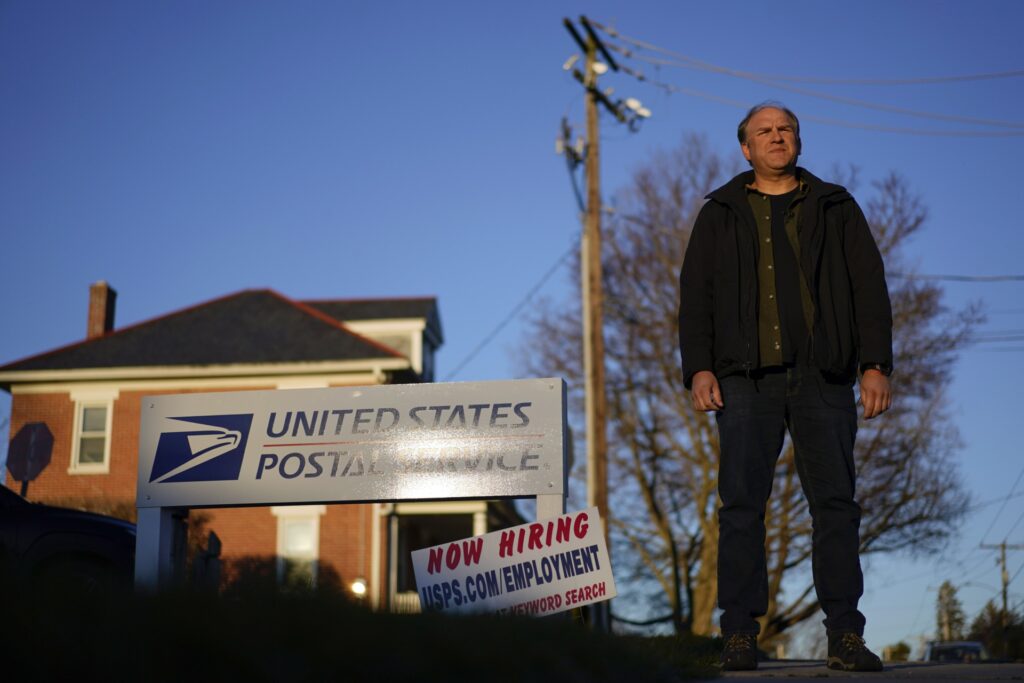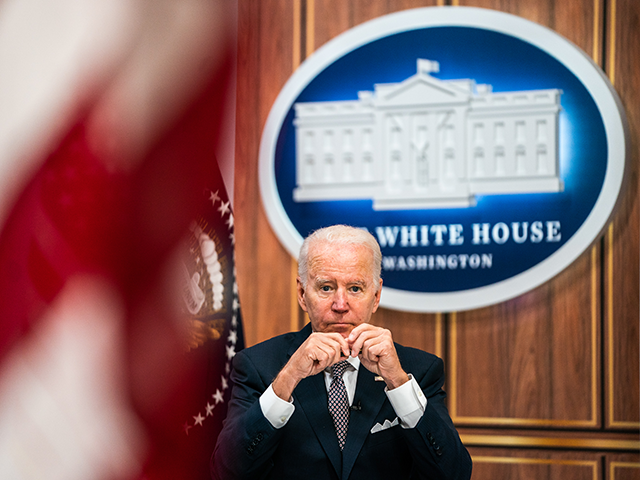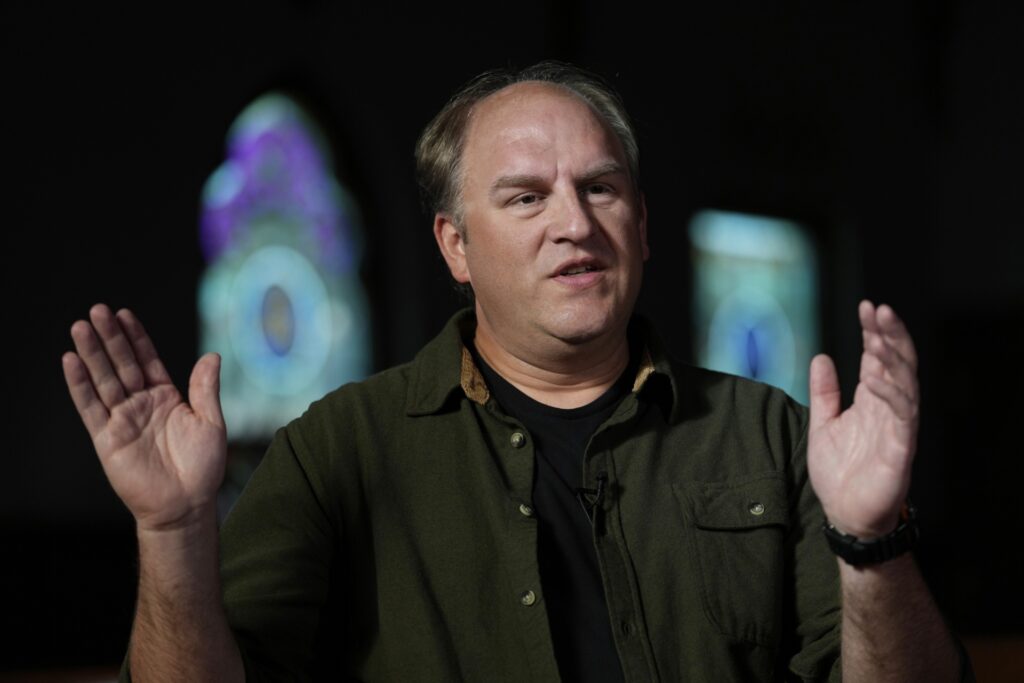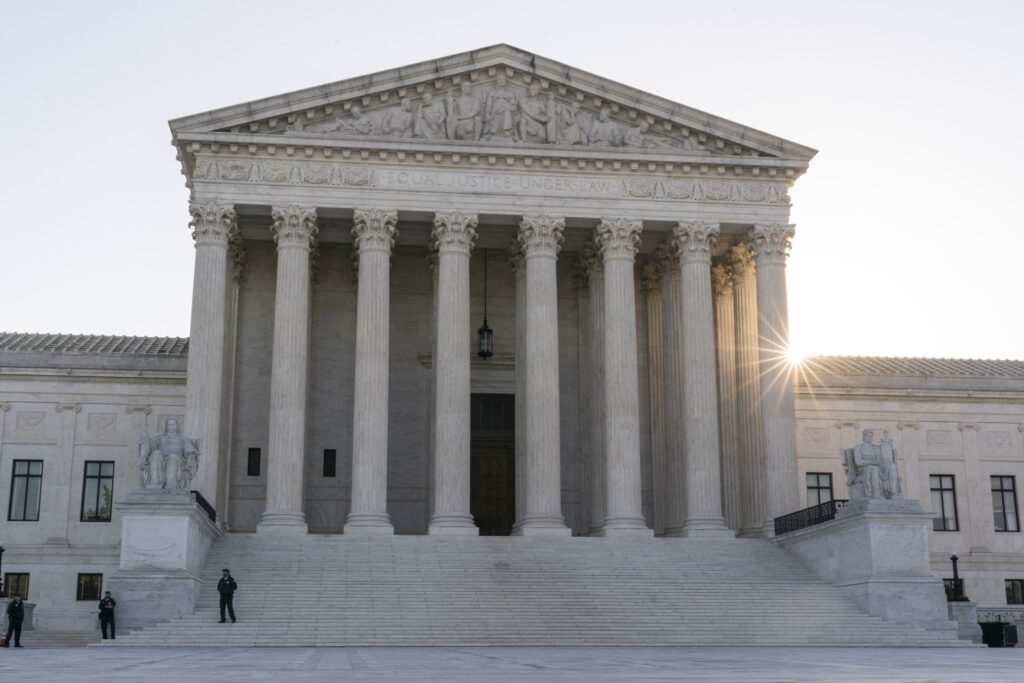There is no problem in the United States with religious discrimination in the workplace, the Biden administration argued to the U.S. Supreme Court on Tuesday in a case about a Christian postal worker who lost his job for not being able to work on Sundays.
That postal worker, Gerald Groff, sued under Title VII of the Civil Rights Act. “Title VII requires religious accommodations absent an undue hardship on the conduct of the employer’s business,” explained Aaron Streett, lead counsel for Groff. Streett added that the current legal test from a previous Supreme Court case “makes a mockery of the English language, and no party truly defends it today.”

Gerald Groff, a former postal worker whose case will be argued before the Supreme Court, stands during a television interview near a “Now Hiring” sign posted at the roadside at the United State Postal Service, Wednesday, March 8, 2023, in Quarryville, Pennsylvania. (AP Photo/Carolyn Kaster)
U.S. Solicitor General Elizabeth Prelogar did not mount a serious defense of the standard from that previous case, the Supreme Court’s 1977 TWA v. Hardison decision, but argued that there is not a significant problem with religious discrimination in workplaces in this country and that the Supreme Court should therefore maintain the current regime’s level of protection.
“We have amicus briefs here by many representatives of many minority religions, Muslims, Hindus, Orthodox Jews, Seventh Day Adventists, and they all say that that is just not true,” Justice Samuel Alito responded incredulously. “And that Hardison has violated their right to religious liberty. Are they wrong?”
The current case was appealed to the Supreme Court after the U.S. Court of Appeals for the Third Circuit ruled that USPS is not required to provide Gerald Groff with a religious accommodation because an accommodation would have caused undue hardship. The federal appeals court cited Hardison, which set the precedent that employers must accommodate the religious practices of their employees unless doing so would impose a “more than a de minimis [of little importance] cost.”
First Liberty Institute, a nonprofit Christian conservative legal organization, along with Streett of Baker Botts, are representing Groff. They argue that Groff is protected by Title VII from discrimination based on his religious beliefs and practices as a federal employee with USPS, and that Hardison is a poorly reasoned precedent that has protected corporations at the expense of religious employees for more than four decades.
Case Background
Groff, who is an Evangelical Christian, began working with USPS in 2012 in Lancaster County, Pennsylvania as a mail carrier. When his post office branch began making Sunday deliveries for Amazon, he chose to be reassigned to another branch that did not participate in Sunday deliveries, “even though it came at the cost of his seniority,” according to First Liberty. However, the second branch soon began to make deliveries on Sundays for Amazon as well, so Groff asked for a religious accommodation.
According to Groff’s attorneys, the postmaster initially granted his request and allowed him to work extra shifts on other days of the week. But later on, USPS only offered proposals that would have required Groff to work on Sundays.
“Forced to choose between his faith and his career, Groff resigned and sued the USPS. The district court sided with the USPS, concluding that accommodating Groff would pose an undue hardship on USPS. The Third Circuit upheld that decision,” according to First Liberty.
Hearing Highlights
Streett opened oral arguments on Tuesday, asking the Supreme Court to overturn the precedent set in its Hardison case and reverse the lower courts’ decision in Groff’s case.

U.S. President Joe Biden in the South Court Auditorium of the Executive Office Building on June 17, 2022. (Demetrius Freeman/The Washington Post via Getty Images)
“Title VII requires religious accommodations absent an undue hardship on the conduct of the employer’s business. TWA v. Hardison violates the statute’s promise that employees should not be forced to choose between their faith and their job. Hardison’s de minimis test makes a mockery of the English language, and no party truly defends it today,” Streett argued. “…The Court should establish a textual test for undue hardship and reverse the judgment below.”
Justice Samuel Alito notably posed a question about whether the Hardison decision is a result of how the Supreme Court used to handle the Establishment Clause of the First Amendment under the now-defunct Lemon v. Kurtzman precedent.
“Do you think that a change in this Court’s understanding of the meaning of the religion clauses of the First Amendment is a relevant factor in determining whether the statutory interpretation in Hardison should be revisited? It’s really hard to understand the decision in Hardison except as an exercise in constitutional avoidance,” Alito posed.

Gerald Groff, a former postal worker whose case will be argued before the Supreme Court, speaks during a television interview with the Associated Press at a chapel at the Hilton DoubleTree Resort in Lancaster, Pennsylvania, Wednesday, March 8, 2023. (AP Photo/Carolyn Kaster)
He continued:
Although the Court didn’t mention that concept in its opinion, that was very prominent in the briefs and in the oral arguments in Hardison. And a way to understand the adoption of the de minimis test was the view that the Establishment Clause, as interpreted in Lemon, which talked about anything that advances religion, would be violated by any departure from strict neutrality between employees who wanted a secular exemption and those who wanted a religious exemption.
But Abercrombie and some of our later cases do make it clear that that is an incorrect interpretation of the Establishment Clause. So even though constitutional avoidance is not mentioned there, do you think that is a relevant factor?
Alito later asked Solicitor General Elizbeth Prelogar, who argued on behalf of the USPS, whether the U.S. government believes the representatives of religious groups, who filed amicus briefs siding with Groff and asking the Court to overturn Hardison, had simply misunderstood how the ruling has impacted their religious liberty.

A United States Postal Service employee works outside a post office in Wheeling, Illinois, December 3, 2021. (AP Photo/Nam Y. Huh)
“We have amicus briefs here by many representatives of many minority religions, Muslims, Hindus, Orthodox Jews, Seventh Day Adventists, and they all say that that is just not true, and that Hardison has violated their right to religious liberty. Are they wrong?” he asked.
Justice Brett Kavanaugh asked about Footnote 14, “which talks about not de minimis costs by substantial expenditures or substantial additional costs.”
“If we assume, as the Solicitor General, I think, seems to say, that we should not use the term ‘de minimis costs’ but we should use what’s in Hardison in Footnote 14, ‘substantial costs,’ ‘substantial additional costs,’ then that standard, substantial costs, substantial additional costs, is perfectly appropriate,” Kavanaugh posed.
Justice Neil Gorsuch added that both USPS and attorneys for Groff seem to have “common ground” in that they believe courts have long misunderstood the “de minims” language of Hardison
“If there is so much common ground here between the parties and really between the parties and Hardison that, you know, some courts — and it’s been a serious misunderstanding — not all courts, but some courts have taken this ‘de minimis’ language and run with it and say anything more than a trifling will get the employer out of any concerns here, and that’s wrong, and we all agree that’s wrong — why can’t we just say that and be done with it and be silent as to the rest of it?” Gorsuch said.
Prelogar answered, stating that the Supreme Court “made clear” that the “de minimus” language “should not be taken literally to mean every dollar above a trifle is immunizing the employers from liability, that is absolutely a correct statement of the law.”
“It’s consistent with Hardison. It does not require overruling Hardison. And I would be very happy with that clarification,” she said.
Justice Elena Kagan seemed less favorable to Groff’s argument and pointed out that the case is a statutory stare decisis case.
“We’ve said over and over that when there’s a statute involved rather than the Constitution, stare decisis is at its peak….For decades, this has been the rule. Congress has had that opportunity to change it. Congress has not done so. You can count on a finger how many times we have overruled a statutory ruling in that context,” Kagan said.
“…I thought that our statutory decisis rule went like this: It doesn’t really matter whether the thing is wrong. I mean, stare decisis only has a role to play when the ruling is wrong. If the ruling were right, we wouldn’t need statute — we wouldn’t need stare decisis,” she continued. “Stare decisis has a role to play only when a ruling is erroneous, and still, we say…the ball was in Congress’s court. Congress has not done it for reasons of predictability, for reliability, for reliance, for reasons of the credibility of the judicial system. We maintain what we said about what statutes mean.”
The Supreme Court is expected to return a decision in this case before July.
The case is Groff v. United States Postal Service, No. 22-174 in the Supreme Court of the United States.
Breitbart News Senior Legal Contributor Ken Klukowski contributed to this report.



COMMENTS
Please let us know if you're having issues with commenting.